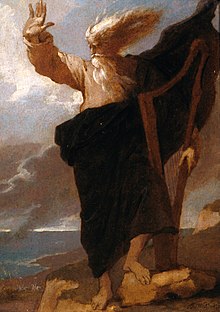
Back برد (شاعر) Arabic Bard Azerbaijani Бард BE-X-OLD Бард Bulgarian Barzh Breton Bard Catalan Bard Czech Barde (sanger) Danish Barde German Bardo Esperanto

In Celtic cultures, a bard is an oral repository and professional story teller, verse-maker, music composer, oral historian and genealogist, employed by a patron (such as a monarch or chieftain) to commemorate one or more of the patron's ancestors and to praise the patron's own activities.
With the decline of a living bardic tradition in the modern period, the term has loosened to mean a generic minstrel or author (especially a famous one). For example, William Shakespeare and Rabindranath Tagore are respectively known as "the Bard of Avon" (often simply "the Bard") and "the Bard of Bengal".[1][2] In 16th-century Scotland, it turned into a derogatory term for an itinerant musician; nonetheless it was later romanticised by Sir Walter Scott (1771–1832).[1]
In the Bengal region of the Indian subcontinent, the title Gayen or Gain was given to bards in medieval times and is today used as a surname by members of the Bengali Kayastha caste.[3][4]
- ^ a b Oxford Dictionary of English, s.v. bard, n.1.
- ^ "Work of Rabindranath Tagore celebrated in London". BBC News. Retrieved 15 July 2015.
- ^ Mookerjee, S. (September 1959). "Bengalee surnames" (PDF). Annals of Library and Information Studies. 6 (3): 6.
- ^ Sen Gupta, Shankar (1965). Folklorists of Bengal (Volume 1 ed.). Calcutta, India: Indian Publications.